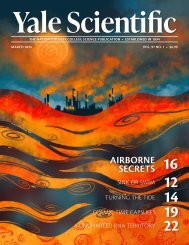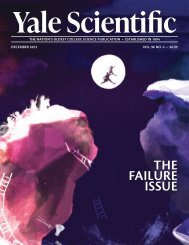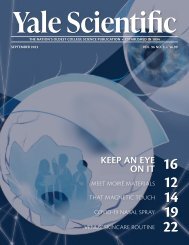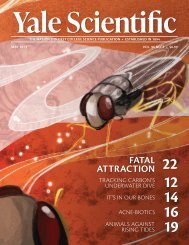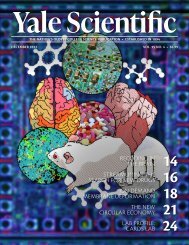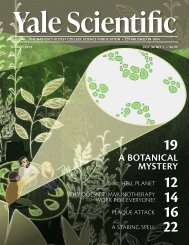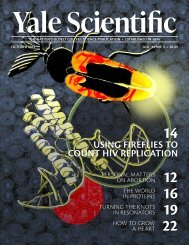YSM Issue 87.4
Create successful ePaper yourself
Turn your PDF publications into a flip-book with our unique Google optimized e-Paper software.
women
FOCUS
IMAGE COURTESY OF RACI.ORG
‘
Actively inviting and
welcoming women into the
sciences is key to continuing ‘the momentum.
women; she genuinely enjoys teaching at the
introductory level. “But as soon as I said I
was interested, everybody was saying, ‘That
will be great, we need women teaching
this,’” she recalled.
The Perspectives on Science and
Engineering program, a supplementary
course for freshmen seriously interested in
STEM fields, also endeavors to captivate
the interest of freshman women in science.
Last fall, three of the five speakers for
the program were women, and this fall,
all of them are women. William Segraves,
Associate Dean for Science Education at
Yale, said, “It’s been important for women
to be well-represented in the course—it’s
part of how we’re hoping to change what
our nation’s future STEM faculty looks
like.”
Faculty in this program have also
thrown their weight behind the cause. In
Perspectives on Science and Engineering
last year, Ecology and Evolutionary Biology
Professor Richard Prum—one of a minority
of men lecturing as part of PSE—gave the
first class. He diverged from the content of
his lecture, which was about the Evolution
of Beauty, at the end of his talk. His last
slide depicted three female scientists. One
woman posed with dinosaur fossils, another
kneeled to collect measurements, and a third
walked through the jungle
in full field attire. The title
of the slide was “Advice for
Young Women Scientists.”
Two unforgettable bullet
points read: “You belong
here,” and “Science needs
Women!”
Spreading the Word
Actively inviting and welcoming women
into the sciences is key to continuing the
momentum. “It’s really necessary to have
men talking about wanting more women in
science also,” said Wanta. “Not just women
saying, ‘We need more of us!’ But men
saying, ‘We need more of you!’”
Spreading the message to Yale’s entire
community is necessary for women to be
fully integrated in the sciences. “I think that
the university definitely could host more
events, in a way where it’s not obviously
targeted just at women,” said Wanta.
Sponsoring campus-wide symposia, panels,
reports, workshops, would be a way to
include everyone in the movement.
Steitz has spent decades as the only woman
teaching undergrads in MB&B, going out of
her way to ensure that the undergraduates
in her department see a female face. After
all these years, her stubborn persistence
might not be necessary for much longer. In
the past year, the department hired a new
female professor who could teach the class.
“Now I feel like I could retire, because there
would be at least one woman to take over,”
Steitz said.
I asked Steitz whether she believed that
the status of women in science would
continue to rise. “I think we’ll do better.
It’ll just take a long time,” she said. “If you
bring it to people’s attention, then things
change faster.”
ABOUT THE AUTHOR
TESSA ADLER
TESSA ADLER is a sophomore Ecology & Evolutionary Biology major. She
works in Professor Jetz’s lab on the Map of Life project, researching the global
distribution of terrestrial species.
THE AUTHOR WOULD LIKE TO THANK all of her interviewees for the work
they’ve done to advance the cause of women in science. She would also like
to personally thank her mentors Jessica Brown, Joan Steitz, and Wenqing Xu.
FURTHER READING
Reuben, Ernesto, Paola Sapienza, and Luigi Zingales. “How stereotypes impair
women’s careers in science.” Proceedings of the National Academy of Sciences
111, no. 12 (2014): 4403-4408.
www.yalescientific.org
October 2014
Yale Scientific Magazine
21




